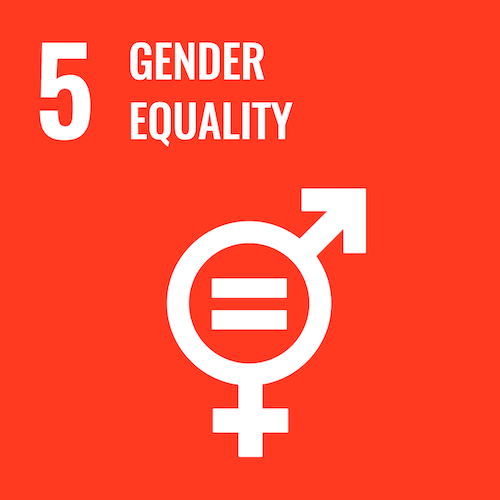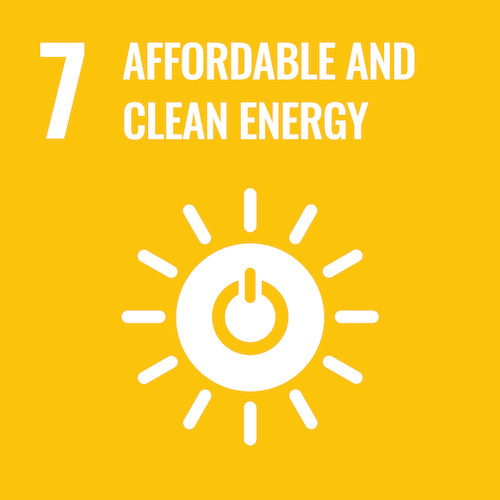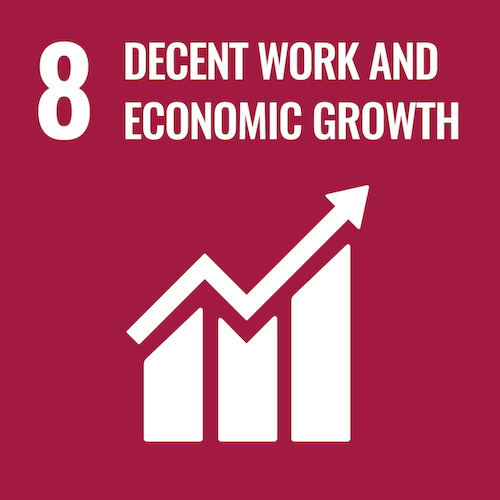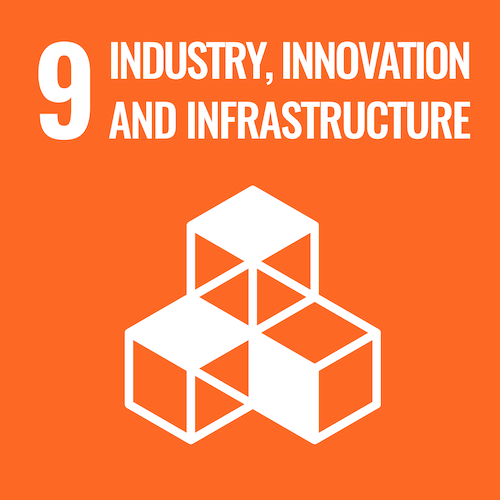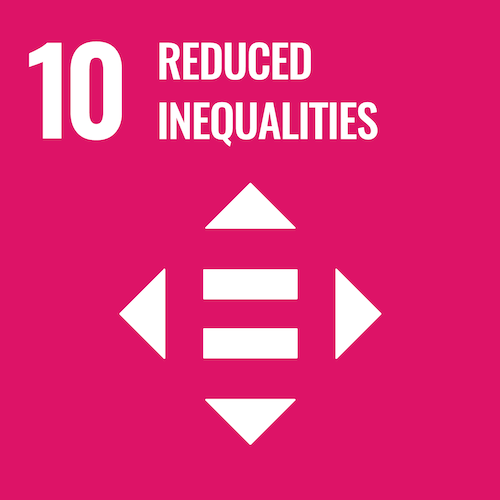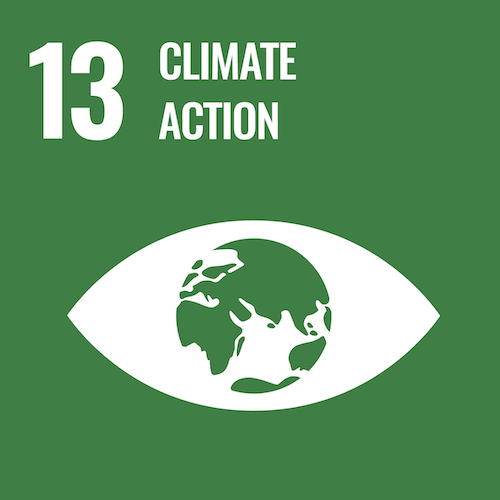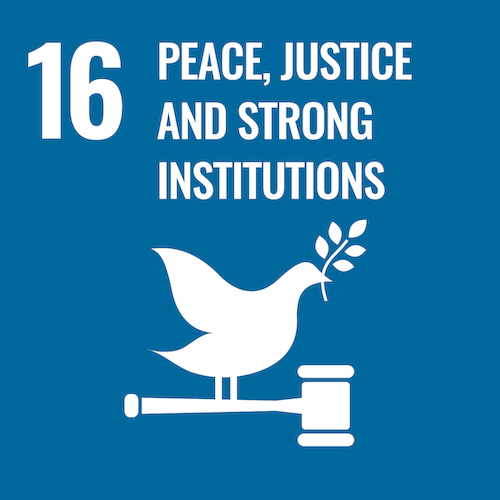GoDaddy 2024 Sustainability Report: Frameworks & Metrics | United Nations Sustainable Development Goals (SDGs)
Originally published in GoDaddy's 2024 Sustainability Report
United Nations Sustainable Development Goals (SDGs)
SDG Goal: SDG 5: Gender Equality
Actions:
- People & Culture > Business Aligned People-Centered Strategy, pp. 20-25
SDG Goal: SDG 7: Affordable and Clean Energy
Actions:
- Environmental Impact > Energy, p. 45
SDG Goal: SDG 8: Decent Work and Economic Growth
Actions:
SDG Goal: SDG 9: Industry, Innovation, and Infrastructure
Actions:
- Responsible Governance & Operations, pp. 31-41
SDG Goal: SDG 10: Reduced Inequalities
Actions:
- People & Culture > Business Aligned People-Centered Strategy, pp. 20-25
- People & Culture > Employee Experience, pp. 26-29
- Customers & Communities > Inclusive Entrepreneurship, pp.13-16,
- Customers & Communities > Community Engagement, p. 17
SDG Goal: SDG 13: Climate Action
Actions:
- Environmental Impact > Climate Change, pp. 43-44
SDG Goal: SDG 16: Peace, Justice, and Strong Institutions
Actions:
- Customers & Communities > Customer Experience, pp. 11-12
Task Force on Climate-Related Financial Disclosures (TCFD)
Topic & Focus Area:
Governance
Board of Directors oversight of climate related risks and opportunities:
Our Board of Directors is responsible for overseeing GoDaddy’s enterprise-wide risks, the formation of our long-term strategic, financial, and organizational goals, and the plans designed to achieve such goals. The Board of Directors and its committees also oversee strategic, legal, regulatory, financial, management, and operational risks.
The Nominating and Governance Committee oversees GoDaddy’s sustainability strategy, practices, and programs, including in relation to risk mitigation and reporting. The Nominating and Governance Committee also reviews public disclosures on such matters, including our proxy statement and annual sustainability report. The Nominating and Governance Committee regularly reports to the Board of Directors on these topics.
- About GoDaddy > Sustainability Governance, pp. 8-9
- Honest & Ethical Conduct > Corporate Governance, p. 33
Management’s role in assessing and managing climate-related risks and opportunities
We maintain a Sustainability Working Group, which supports our ongoing commitment to sustainable practices and transparent disclosures. The Working Group, which is chaired by the Corporate Sustainability and ESG Team (the ESG Team), is a cross-functional team comprised of leaders across our organization who represent GoDaddy’s priority topics. The Working Group is responsible for guiding and executing the company’s sustainability strategy by managing and monitoring our sustainability impacts, risks, and opportunities.
The ESG Team is responsible for reviewing and reporting on climate-related issues, including progress toward overall climate related goals. The ESG Team works closely with GoDaddy’s Corporate Secretary on sustainability matters. In addition, members of our global leadership team are responsible for the management and oversight of GoDaddy’s GHG emissions, including as they relate to our data center operations. These executives, and key members on their teams, have collaborated with the ESG team on the development of GoDaddy’s corporate GHG emissions reduction targets.
In addition, our Assurance, Risk, and Compliance Team is responsible for maintaining GoDaddy’s risk management framework and identifying internal and external risk factors that prevent the company from achieving its strategic and operational objectives. Leveraging GoDaddy’s risk management framework methods and criteria, this team supported the ESG Team’s assessment and identification of potential climate-related risks and opportunities.
- About GoDaddy > Sustainability Governance, pp. 8-9
- Honest & Ethical Conduct > Corporate Governance, p. 33
Strategy
Climate-related risks and opportunities the organization has identified over the short-, medium-, and long-term
In our 2024 qualitative scenario analysis, we identified potential climate-related physical risks related to our data center operations and offices. The scenario analysis also assessed nine hazards to identify the impact of climate-driven extreme weather events (acute) and longer-term changes in water stress (chronic). The analysis presented extreme heat as the single hazard that uniformly increases across all assets from the present-day to the short- and medium-terms. Other hazards were assessed as site-specific hazards with certain of such risks assessed as high in the present-day and remaining elevated through the medium-term period. In addition, the analysis identified potential transition risks for the organization, which included carbon pricing, mandates on efficiency and carbon emissions from existing products, and costs associated with a transition to lower carbon pathways. These potential risks increase from the present day through the short- and medium-terms with the magnitude of increase depending on scenario.
Potential opportunity drivers were also identified, including enhanced business continuity and resilience planning, value-chain decarbonization, industry climate leadership, impact investing, and customer demand for sustainable products and solutions. Potential transition opportunities assessed include expanding global renewable energy capacity and adoption of additional energy-efficiency measures to reduce environmental impact and increase consumer confidence and favorability. Both opportunities show an increased magnitude of opportunity from the present day through the short- and medium-terms.
Impact on business, strategy, and financial planning
Our Double Materiality Assessment (DMA) identified impacts, risks, and opportunities (IROs) across GoDaddy’s business operations encompassing a range of ESG topics. The DMA process and IRO list originated through engagement with GoDaddy management and subject matter experts. The business and external impacts were assessed through a materiality scoring aligned with GoDaddy’s risk management system. This materiality scoring included financial, operational, reputational, compliance, and partnership components. The scoring was informed through physical and transition climate scenario analysis. The IRO scoring and materiality determination were reviewed by members of GoDaddy’s management team.
Scenario analysis and resiliency strategy
In 2024, we engaged a third-party firm to carry out a qualitative scenario analysis to assess potential climate-related physical risks related to our data center operations and offices at an asset- level, both owned and leased, for present-day, short-, and medium-term time periods and for both lower and higher emission scenarios. Scenario analyses were also carried out for potential transition risks and opportunities for two future scenarios.
Assessing three time periods and multiple climate scenarios provided information on the uncertainty and variability of potential climate-related risks and opportunities and their potential impacts on our sustainability strategies across different planning horizons.
The scenarios chosen also provided lower and higher impact views on potential risks and opportunities, giving a fuller range of outcomes to inform decision making. The asset-level nature of the physical scenario analysis can also be used to inform adaptation and resilience planning for specific GoDaddy owned and leased sites. The approach to transition scenario analysis allows for updating of scenarios as global and regional policies evolve.
Risk Management
Process for identifying and assessing climate-related risks
Our DMA included climate-related physical and transition risks. These risks were assessed through a materiality scoring process that considered likelihood and severity of impacts across various categories, including financial, operational, reputational, compliance, and partnerships to provide measures of inherent risk to which control and mitigation measures can be applied to determine levels of residual risk. The DMA process included the development of a comprehensive IRO register reflecting GoDaddy’s most important potential risks, including those related to climate change.
Process for managing risk
Climate-related risks are managed by the ESG Team in collaboration with leaders from across the organization. These leaders are responsible for monitoring and responding to any specified risk that could impact the company's strategic or operational objectives.
Integration into overall risk management
Our ARC Team leads our enterprise risk management program. The ARC Team is responsible for identifying key risks that could impact the company's strategy, operations, or compliance. The ARC Team assists our Leadership Team in defining metrics to monitor such risks and respond proactively.
GoDaddy’s assessment of potential climate-related risk and opportunity leveraged standard criteria used in our risk management framework. Following GoDaddy's standard processes, potential climate-related risks that could impact the company's strategic or operational objectives are managed by the ESG Team in collaboration with leaders from relevant teams to monitor and respond to any specified risks.
Metrics and Targets
Metrics
- Absolute Scope 1, 2, and 3 GHG emissions
- Percentage renewable electricity procured
- Energy Usage
Appendix > Frameworks & Metrics > Environmental Metrics, pp. 48-49
Scope 1, 2, 3 Emissions
GoDaddy discloses its Scope 1, 2, and 3 GHG emissions in the Framework & Metrics section of this report.
Appendix > Frameworks & Metrics > Environmental Metrics, pp. 48-49
Targets
GoDaddy has a goal to reduce Scope 1 and 2 emissions (market-based) by 90% by 2030 from a 2019 baseline.
Environmental Impact > Climate Change, pp. 43-44
To learn more, read our 2024 Sustainability Report.
About This Report
This GoDaddy 2024 Sustainability Report details our progress toward our corporate sustainability goals, strategies, and initiatives in support of our overarching corporate mission and values. Unless otherwise noted, this report reflects our corporate sustainability performance across our global operations covering the fiscal year period from January 1 to December 31, 2024. To demonstrate our commitment to transparent communication regarding our sustainability progress, we routinely share updates through our website and our annual Sustainability Report. We welcome your questions, comments, and feedback on this report by contacting ESG@GoDaddy.com.
This report references the Global Reporting Initiative (GRI) Standards, includes select Sustainability Accounting Standards Board (SASB) metrics for the Internet Media and Services sector, and the Task Force on Climate Related Financial Disclosures (TCFD). We also disclose our contributions and progress toward priority UN SDGs. For additional information on how we align with these frameworks and key indicators demonstrating our sustainability performance, please refer to the Frameworks & Metrics section.




